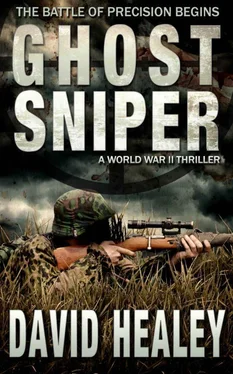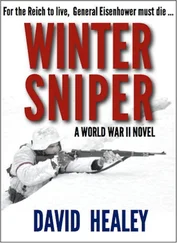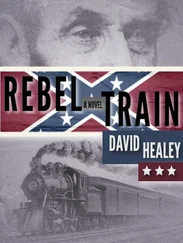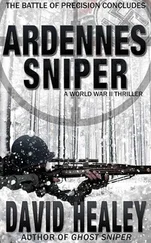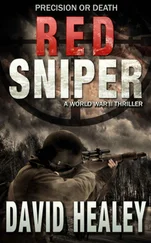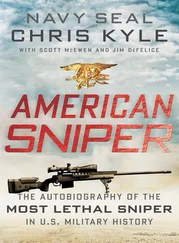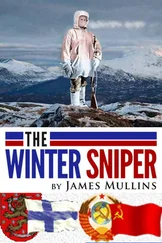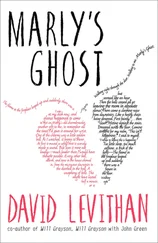“Like what?”
He stooped and pulled a wicked-looking little knife from his boot. “If I was you, I’d get in close and stab that son of a bitch in the belly with this here pigsticker. He might take a while to die, but you’ll kill him sure as shit.”
She took the knife. “Thank you. And Cole—I like that name— please do not tell the lieutenant. He might not understand. I agree that he is one who plays by the rules.”
“Like I said, Jolie, what rules? This here is a war.”
The shooting lesson over, the remaining band of snipers packed up and moved out. Lieutenant Mulholland had no clear orders other than to engage the enemy, and so they trudged along the road toward Carentan. The action at the bridge had taken up most of the long June day and already the shadows stretched far and deep across the fields.
After the rush of adrenalin and pounding hearts during the fight, they now felt curiously empty, like a balloon that the helium had gone out of.
It wasn’t a feeling that lasted long. They had not gone far when they were overtaken by a Jeep tearing down the dirt road. It was a little unusual to see one of the Jeeps traveling alone. Considering that the woods and fields all around them were still contested by the Allies and Germans, the occupant would have been better off in a Sherman tank or even on foot. The sharp whine of the Jeep engine attracted too much attention. Whoever was at the wheel had to be either desperate or foolish. The vehicle skidded to a stop beside them.
“Ya’ll are snipers?” the sergeant at the wheel asked. With the dark circles under his eyes and unshaven face, he had the haggard look of a man who hadn’t slept in a while. His eyes went to the telescopic sights of their rifles, and he didn’t wait for an answer to his own question. “You could maybe do some good up this road at a little town called Bienville. We took it from the Germans today but they chewed us up good. There’s only about a hundred men holding the town, and it looks like the Germans will try to take it back tomorrow.”
“Seems to me like you’re going in the wrong direction,” Mulholland said. “If they’re so hard up for help, why are you heading away?”
“We only had two radios and they’re both shot to hell. I volunteered to drive out and try to get us some reinforcements.”
“We could hear that Jeep coming for miles. You’re quite a target,” Mulholland said. “You’d be better off on foot, or even on a bicycle.”
“No time for that,” the soldier said. His foot toyed with the clutch and the Jeep lurched forward, rolled back. “We need to hold that town when the Jerries show up in the morning. It’s one of the key points along that road into Carentan. I think we took them by surprise, but if we give up that town we’ll lose twice as many men getting it back.”
“Right up this road?” Mulholland asked. “It looks like we’re headed that way. Might as well see if we can help out.”
“Shoot a Jerry for me,” the driver said, and let his foot off the clutch. The Jeep shot forward and careened down the road between the tall hedges.
Lieutenant Mulholland turned to look at his squad. His command now consisted of two snipers (or maybe one and a half considering Vaccaro probably couldn’t hit a target smaller than a barn), a French girl, a captured German boy and an English paratrooper so gung ho that the lieutenant suspected the Tommy had maybe landed on his head coming down. Somewhere along the line they had become a seriously motley unit. All they needed now was for a stray dog to tag along.
“Jesus,” he said out loud to no one in particular. He didn’t normally use the lord’s name lightly but that was par for the course since coming ashore at Omaha Beach; he was beginning to question what sort of person he had become over the last few days. Nobody had prepared him for this at OCS.
The little group stood in the road, waiting for him to tell them what to do. Getting antsy, Vaccaro shifted his rifle to his other hand and spoke up, “Lieutenant?”
At times like this, the lieutenant sometimes thought of his grandfather, who had served with General Grant during the Civil War. He recalled a family story about his grandfather saving the famous general from a Confederate sharpshooter. Had Brendan Mulholland ever felt this overwhelmed? It had been a different time and a different enemy, but the lieutenant took strength from the fact that he wasn’t the first Mulholland to fight a war. His grandfather hadn’t let General Grant down, and Mulholland wasn’t about to give up on his ragtag squad.
“You heard the man,” Mulholland said. “Let’s go rescue us a town.”
• • •
The town of Bienville was a deceptively quaint and sleepy French village. With its old stone houses, shops with brightly painted signs and doors, church steeple, and narrow cobblestoned streets, the village was the sort of place a traveler on the road to Carentan might have used up a frame or two on a precious roll of film to capture.
Indeed, the town thrived mainly on commerce because it was surrounded by wet, boggy marshes that did not make good crop or grazing land. To make matters worse, the Germans had flooded the marshes to ensnare paratroopers. The flooded fields and marshes around Bienville now held the drowned bodies of scores of American paratroopers.
The flooding also had created a bottleneck so that anyone bound for the key Norman city of Carentan had to stay on the road through Bienville. Skirting the town through the flooded fields surrounding it would be impossible. Beyond the marshes were the hedgerows to contend with. Essentially, the Germans had managed to make the village into a key strategic point. Nobody was getting anywhere by road in Normandy unless they came through Bienville.
And yet the Germans had lost the village in a short, sharp battle the day before. The invasion at the beaches had caused such confusion that the German High Command in Normandy had overlooked the defense of the town. The small force in the village had been taken by surprise when a unit of Americans suddenly came up the road and raced into town.
The German defenders fled or were killed; a Wehrmacht doctor and several medics had stayed behind to care for the wounded on both sides, turning the church into a makeshift hospital. There was no hope yet of transporting the wounded back to the beach head for more advanced medical care.
No stranger to conflict, the village had grown up around the church founded in the eleventh century. Other troops had marched through; other battles had been fought nearby. Though this was a French village, the combatants were now Germans and Americans, and the weapons were rifles and machine guns rather than spears and broadswords, longbows and crossbows.
The old stone walls were pockmarked by bullets. In the narrow streets between the buildings, the smell of cordite mingled with the scent of fresh-baked bread.
The American defenders had set up a machine gun nest overlooking the main road into town, which the snipers approached cautiously.
“Hold your fire!” Mulholland shouted, then waved. Somebody waved back, and they approached the town.
“Don’t tell me you’re the freakin’ cavalry,” one of the machine gunners said. “We’re gonna need a few more guns to hold off the Germans if they send Panzers at us.”
“Hey, buddy, we can turn around and leave if you don’t want us,” Vaccaro said.
“Don’t get sore,” the machine gunner said. “We’ll take what we can get. We’ve only got about eighty men to defend this place. How many do you think the Germans are going to send at us in the morning?”
“More than eighty,” Vaccaro said.
“Yeah, it’s like Custer’s Last Stand all over again,” the machine gunner said. “Lucky for us the Jerries don’t take scalps.”
Читать дальше
